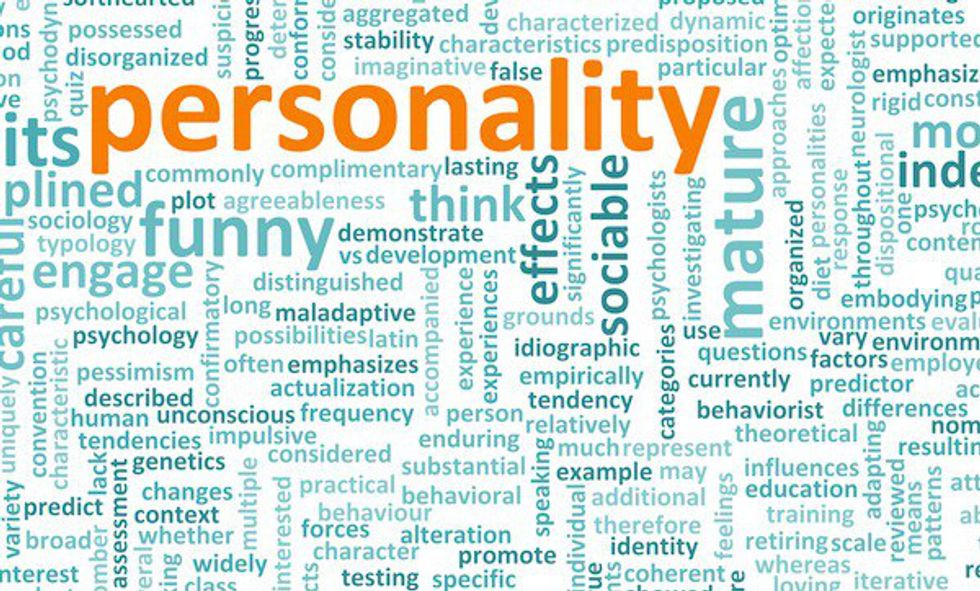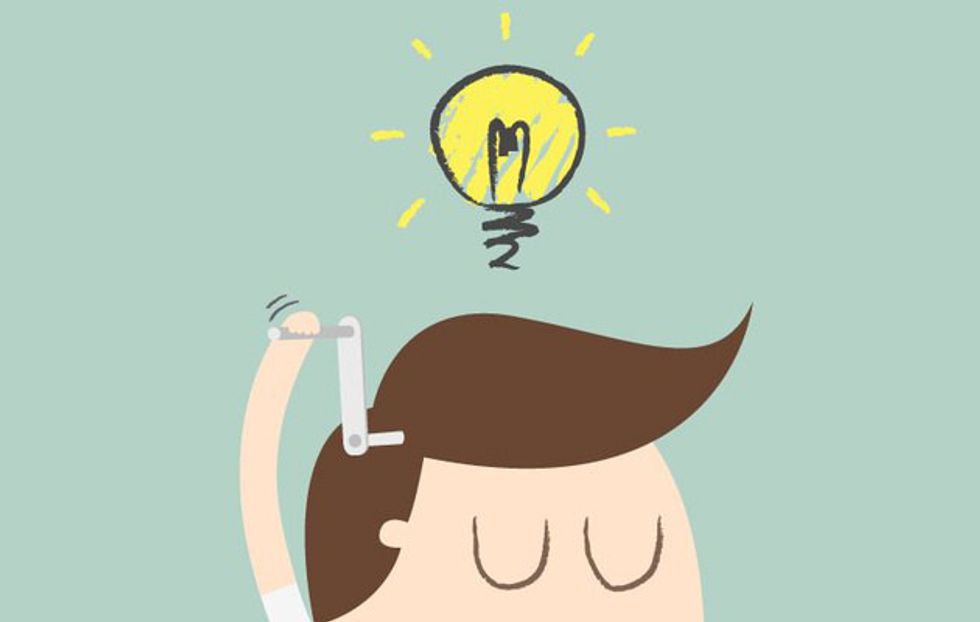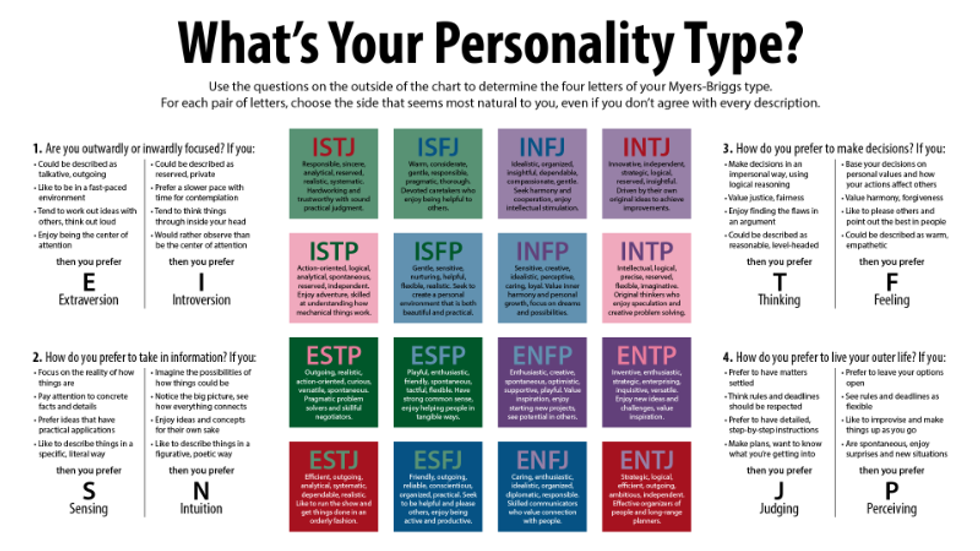You’ve probably seen these strange four letters that don’t make any recognizable words or any patterns -- maybe through surfing the web or from a psychology or GE class. The eight different letters are divided into groups of four and have 16 possible connections. They find themselves always connected to the world of psychology and recognized as a way of determining personality -- so recognized that many occupations use this test to know more about their employees.
I’m talking about the MBTI, or Myers-Briggs Test Indicator. So many consider it as the most simple yet detailed personality test to live by. For a while, psychologists even considered it to be the best way to determine a person's personality. Many individuals still believe in its convincing accuracy and reliability to understand themselves or the people around them.
In reality, its reliability and accuracy is actually questionable -- though not as questionable as your Zodiac's personality. It’s common for your personality type to change after retaking the test. Like all personality tests, doesn't completely determine who you truly are as a person. But Myers-Briggs isn’t a random Buzzfeed quiz that answers what kind of Disney Princess you are. And it's not the same as the 12 Zodiacs of the Western or Eastern worlds.
Despite its accuracy, the MBTI is still used by employers and psychologists today. The test was created by a mother and daughter team, Katherine Briggs and Isabel Myers, which was in turn developed from the Carl Jung theory on psychological type. It was then revised over the years to be more accurate. The MBTI is pretty recent (given the fact that the interest in psychology only began about a century ago) but has quickly become important for people who want to know more about you: your bosses, your doctors and anyone who is interested in how you function mentally.
I’m no psychologist or expert in the matter, however, and I’m not here to argue for or against it. I’m more interested in explaining what it is and sharing my interest in these things.
Both my friends and I talk about it often, but mainly because we see it as a “that’s interesting” moment. We’re aware of how it doesn’t truly define us or create a label. We see the similarities the results of the quiz say or how our horoscopes match with our day, but we always go back to MBTI. Maybe because it was the science that covered it, or even the fact that there’s more variety compared to the eight possible results on a quiz that determined what kind of pizza I am or the 12 (or should I say 13?) different Zodiacs. There are 16 possible combinations and four letters that could be the best representation of your personality.
If you want to determine your personality based on the MBTI, tests are available for free online. They tend to take around 12 minutes or so. Results are based on how much you agree on the list of statements about yourself. The four letters that make your personality are based on the four main questions that are divided into those multiple statements: where your energy comes from, how to handle projects, how you judge and how you live day to day. If you want to take a brief version, answer the following questions below. Taking the longer test might be more accurate than simply answering four questions.
Question 1:
The first question is whether your energy is focused on spending time with a group of people or spending time alone: extroverted (E) versus introverted (I). Being extroverted doesn’t necessarily mean you enjoy talking. Being introverted doesn’t mean the opposite; it’s more of who you prefer to be with and what you tend to focus on when interacting. Some prefer to unplug by spending quiet moments by themselves, while others feel more comfortable with being with others when they want to unplug. Some people prefer the loudness and attention, some prefer the quietness and solitude. Introversion/Extroversion also refers to where your attention is more towards: the outer world and people or the inner world and ideas. Either way, whether you consider yourself more extroverted (E) or introverted (I), you now have your first letter.
Question 2:
The second letter -- sensory (S) or intuitive (N) -- determines how you learn and process the information given or how you work on a project. One way is by either simply using your five common senses and focusing on the current situation, while the other way is using patterns collected from the past and focusing on the future. In other words, either you prefer the facts and the concrete, or the possibilities and the abstract; realist or dreamer, the present or the future. When it comes to projects, the realist tends to go step by step in order to complete the given goal while the dreamer sees the overall purpose of what the goal should be. Those who tend to be more sensory (S) go by detail and what’s in front of them, while the intuitive (N) see the big picture of what they’re given.
Question 3:
The third letter of your personality determines your method of making decisions. Even if we’re not judges by occupation, this letter represents how we make choices in our daily lives. One way is through a more argumentative direction. By making your choices in that way, you use what you know about each choice and use logic and your objective to choose. The other way is more on personal beliefs and how others will be affected each possible choice. Those who see the latter tend to have a personal connection to their decisions when making their decisions while the former has no personal connections. Just like the previous letter, either you take a more realistic when making your decisions or a more idealistic in a sense. Those who use logic and tend to be more indifferent in their choices fall in the thinking (T) trait; Those who use personal concern and tend to be more emotional in their choices fall in the feeling (F) trait.
Question 4:
The last letter out of the four determines your daily schedule. Even though one of of the two, judging(J), seems to fall in line with the thinking trait and the feeling trait, it actually represents something else. Judging means that you prefer schedules and structure in your life. From waking up at the same time every day to finishing things as soon as possible, you already created a step-by-step procedure for yourself. Meanwhile, the second trait, perceiving (P) prefers the spontaneous and going with the flow. Even if they finish something, they keep it open just in case there’s more work to be done. In simpler terms: how uptight and organized you are in life. Whether you try to be in control of your schedule or rely on instincts to complete goals, this is the last trait determined by the MBTI.
Here are the possible results. You can dive further into your personality by simply searching up your type whenever you have time.
Like I said before, it’s not 100 percent accurate; in fact, there are articles that discuss why MBTI isn't worth acknowledging or even deemed dangerous to rely on. Test results can vary after retakes (whether you took it again after a few minutes or after a few years) and switching to different letters is pretty normal. The reason for different results isn't just because you didn't exactly take the test correctly or your answers were too ambiguous that they can't determine which letter really fits you the most. For example, changes in your life can make you adapt a different letter (as we grow older and become more accustomed to being in the workforce, our lives become more structured due to our occupations and the amount of perceiving types decrease because of this).
Whether you do believe in the MBTI or see it as a glorified personality test, I still recommend taking it out of spite. It’s quite interesting to how much the results connect to what you already know about yourself. There are descriptions that further analyze your four letters like your Horoscope.
Just like a horoscope doesn’t determine your character, the MBTI doesn’t either. Don’t take them to hear too much, but go ahead and laugh it off once you get your results.




























